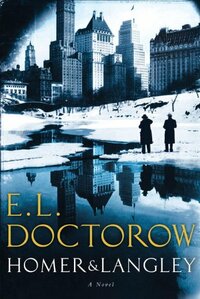You need to sign in or sign up before continuing.
Take a photo of a barcode or cover
This is a fictional story about the famed Collyer brothers, Homer and Langley. Who lived in New York City and eventually cut themselves off from the world. Their true life story probably would have taken an entire season of Hoarding:Buried Alive to tell. This story is told entirely by Homer, the blind brother, and recounts their lives from the time they are young men to their eventual end.
Truth is stranger than fiction. And in the case of the Collyer brothers, it's probably more entertaining. Doctorow took many liberties with the brothers' biographies, including postponing their deaths from 1947 to the 1970s. In doing so, he hit all the high points of 20th Century American history. The effect was unfortunate; the story and its telling often felt like a cross between Forrest Gump and Grandpa Simpson.
Oh but what could this story of reclusive obsessive compulsive hoarders have been in the hands of a true biographer or a master of psychological fiction? I would prefer Joyce Carol Oates' version of this story: more an intimate portrait of psychosis, less a catalog of old timey menu items and technologies.
Oh but what could this story of reclusive obsessive compulsive hoarders have been in the hands of a true biographer or a master of psychological fiction? I would prefer Joyce Carol Oates' version of this story: more an intimate portrait of psychosis, less a catalog of old timey menu items and technologies.
I'm not gonna lie. I skimmed toward the end. What can I say? I got bored.
Ever since reading Ghosty Men, I've wanted to read Homer & Langley, E.L. Doctorow's fictional take on the tragic and true story of the reclusive Collyer brothers, a pair of hoarders who infamously died in their Harlem residence after decades of collecting newspapers, garbage, trinkets and ephemera, one crushed under a pile of debris, the other an invalid who starved to death after his brother's passing.
Doctorow wrote the book from the blind, intuitive Homer's perspective, as he observes his brother Langley leave to fight in the Great War and return a damaged man. The story follows the brothers from the turn of the century through the 1970s and Doctorow manages to weave in New York, national, and international history. My only complaint on that front is that the history and their involvement got a little gimicky in a Forrest Gump kind of way.
Other than that, a thoughtful read.
Doctorow wrote the book from the blind, intuitive Homer's perspective, as he observes his brother Langley leave to fight in the Great War and return a damaged man. The story follows the brothers from the turn of the century through the 1970s and Doctorow manages to weave in New York, national, and international history. My only complaint on that front is that the history and their involvement got a little gimicky in a Forrest Gump kind of way.
Other than that, a thoughtful read.
informative
reflective
medium-paced
Plot or Character Driven:
Character
Strong character development:
Complicated
Loveable characters:
Complicated
Enjoyed this book...the slow changes in a persons quirks are not immediately recognized as madness until they are taken in their totality. One person's clutter and madness is another's hobby and quirks.
Really interesting, unusual book. It made me want to know more about the real people behind the story. Very well written.
Doctorow tells the brothers' story without a hint of creepiness. Although this is fiction, it could really explain how these compulsive hoarders wound up as they did.
no spoilers.
Blurb: While this is an excellent fictional portrayal of the famous Collyer brothers, I realized I would have preferred a non-fiction book about them. As a snapshot of the 20th century, it's a really interesting book.
Long version: I was hoping that this would be much more of a historical fiction novel, where the reader is well aware of what's fiction and what's not. I have no idea how much of this was accurate, or if there was much research at all. (I imagine there was.) Following the two brothers through the twentieth century, with their oddities and their gradual descent into a house filled with materials collected, it very much tracks with our current obsession with news, and a kind of paranoia about government. It was a sad, and truly dysfunctional relationship between the brothers, and Doctorow does a wonderful job of making the reader feel as disoriented as Homer, the narrator does. It's a well-written book with beautiful imagery and a great assortment of oddball characters going through the Collyers' life, but it wasn't the book I was hoping it was. (Which is, truthfully, not the book's fault!) If you like fiction about gradual decline of an individual, you might like this.
Blurb: While this is an excellent fictional portrayal of the famous Collyer brothers, I realized I would have preferred a non-fiction book about them. As a snapshot of the 20th century, it's a really interesting book.
Long version: I was hoping that this would be much more of a historical fiction novel, where the reader is well aware of what's fiction and what's not. I have no idea how much of this was accurate, or if there was much research at all. (I imagine there was.) Following the two brothers through the twentieth century, with their oddities and their gradual descent into a house filled with materials collected, it very much tracks with our current obsession with news, and a kind of paranoia about government. It was a sad, and truly dysfunctional relationship between the brothers, and Doctorow does a wonderful job of making the reader feel as disoriented as Homer, the narrator does. It's a well-written book with beautiful imagery and a great assortment of oddball characters going through the Collyers' life, but it wasn't the book I was hoping it was. (Which is, truthfully, not the book's fault!) If you like fiction about gradual decline of an individual, you might like this.





